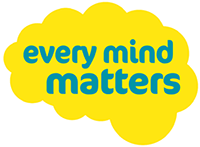Mental Health Advice for Parents and Carers
Mental Ill Health
Anyone can suffer with mental ill health at any time in their life. This could follow a stressful time in your life, such as the loss of a job, financial hardship, physical illness or divorce, and this can affect anyone in the family.
Being a parent or carer is difficult, but when you or your child's mental health is suffering, it is important that you seek help straight away. Practicing self-care in a non-judgemental and accepting way and taking time out will help you and your family.
Please use this page as a guide to reach out to local and national services that can help you when you or your child need it the most.
If you are really worried about a child:
- contact your local GP, or
- call social care 0161 342 4186 / 0161 342 4222
- 0161 342 2222 (out of hours)
- call 999 if you feel the child is in immediate danger.
Your child's well being
As a parent or carer, you may have concerns around your child's mental health. You may be worried about eating disorders, obsessive behaviours, self-harming, addictions and suicidal ideation.
Help for children can come from several sources, including family, friends, schools and colleges, and the voluntary sector. Charities provide vital and varied interventions via their frontline services, networks, helplines and campaigns.
Usually when a child experiences negative emotions such as sadness, anxiety, feeling frightened or worried, these feelings will pass. If they go on for a long time it may be time to seek help from a professional. Tameside CAMHS (child and adolescent mental health services) can support parents and carers with advice for any child up to 18 years old.
Visit Tameside and Glossop CAMHS: Pennine Care NHS Foundation Trust for more information.
To read more go to NHS resources, Choose well for mental health guides for parents and children.
Are you worried about any of the following issues?
Self-Harm
This can take lots of physical forms, including cutting, burning, bruising, scratching, hair-pulling, poisoning and overdosing. It is often used as a coping mechanism.
There are many reasons why children may try to hurt themselves and it can become a compulsion. When a person self-harms, chemicals are released into the brain which can become addictive. The physical pain of self-harm might feel easier to deal with than the emotional pain that's behind it.
 The NSPCC have some excellent guidance and information on all matters relating to self-harm at Preventing Child Self-Harm & Keep Them Safe | NSPCC.
The NSPCC have some excellent guidance and information on all matters relating to self-harm at Preventing Child Self-Harm & Keep Them Safe | NSPCC.
Obsessive Behaviours & Addictions
Obsessive behaviour can look more like a ritual, where something might be done the same way, or at same time every day, or having the same thoughts but is essentially rooted in fear. This behaviour is carried out to 'protect' from something negative happening.
Addiction can be rooted in a lack of satisfaction if the behaviour is not carried out and a desire to escape. When both are present it can be a desire to escape and avoid fear.
Use the following links to find out more information:
Visit T ameside and Glossop CAMHS: Pennine Care NHS Foundation Trust for more details and advice.
ameside and Glossop CAMHS: Pennine Care NHS Foundation Trust for more details and advice.
Specific advice for addictions and Autism can be found at: parents and carers (autism.org.uk).
Low Mood
 Public Health, NHS England have a Better Health, every mind matters campaign with some practical tips to improve sleep, low mood and stress as well as some excellent advice around mental wellbeing.
Public Health, NHS England have a Better Health, every mind matters campaign with some practical tips to improve sleep, low mood and stress as well as some excellent advice around mental wellbeing.
